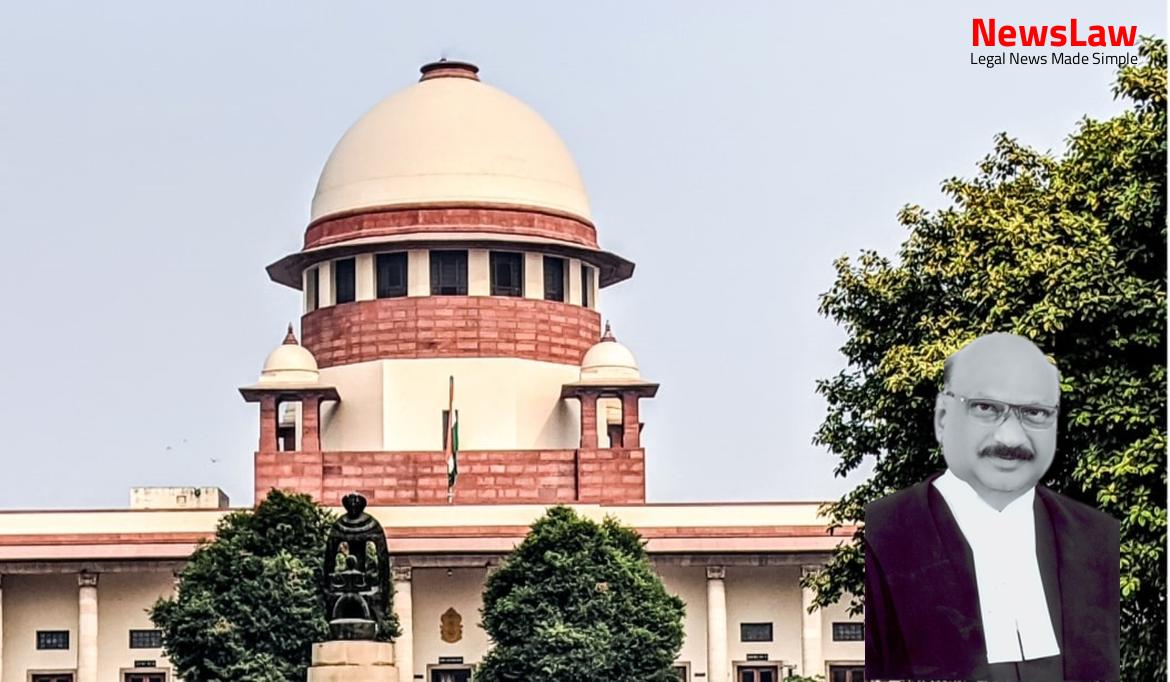Explore a detailed legal analysis of a case involving dishonored cheques issued as security in criminal proceedings. The court’s examination of the provisions of the NI Act and the CrPC provides valuable insights into the complexities surrounding the legal enforceability of debts and liabilities in such scenarios. Stay tuned to understand the finer points of court jurisdiction and legal reasoning in this nuanced context.
Facts
- The High Court cannot exercise its jurisdiction under Section 482 CrPC without establishing an ulterior motive behind the initiation of criminal proceedings
- Both civil and criminal proceedings can be maintained on the same set of facts
- The petitions under Section 482 of CrPC to quash the criminal complaint were dismissed by a Single Judge of the High Court of Gujarat
- Three LCs’ favoring the second respondent were issued by Punjab National Bank at the company’s request.
- LCs provided were not in the format required by the second respondent’s bankers.
- Multiple invoices were raised for power supply from July to September 2016.
- The agreement was terminated by the company on 20 October 2016.
- A criminal complaint was filed against the appellants on 2 November 2017 for dishonored cheques.
- Legal notice issued on 18 September 2017 alleging offenses under Section 138 of the NI Act.
- Summons issued by the Magistrate on 6 November 2017.
- Petitions filed for quashing the criminal complaint under Section 482 of CrPC.
- Background includes a Letter of Intent issued on 19 December 2015 for power supply.
- Regular Civil Suit filed for recovery of dues.
- Communication regarding payment security by cheque and issuance of LCs.
Also Read: Electoral Malpractices in Mayor Election
Arguments
- Mr. Sidharth Luthra and Ms. Meenakshi Arora, learned senior counsel have appeared on behalf of the appellants in support of the appeals.
- The cheques issued to the second respondent were intended to be a security towards payment.
- No inquiry was carried out by the Magistrate despite the provisions of Section 202.
- The summoning order showed a lack of application of mind.
- The institution of a complaint under Section 138 was deemed an abuse of process since the cheques were issued as security and not for depositing.
- The jurisdiction under Section 482 CrPC was considered justified for the above reasons.
- The appellant has relied on the judgment in Indus Airways Private Limited v. Magnum Aviation Private Limited.
- The issues for consideration are: (i) Whether dishonor of a cheque furnished as a ‘security’ falls under Section 138 of the NI Act; (ii) Whether the Magistrate should have postponed process issuance as per Section 202 CrPC; and (iii) Whether a prima facie case of vicarious liability exists against the appellants.
- Appellants argue that a complaint under Section 138 NI Act is not maintainable as the cheque was issued as security and not against a legally enforceable debt.
- The trial has been delayed since 2017 due to proceedings in the High Court and this Court.
Also Read: Balancing Power and Transparency: Electoral Bonds Struck Down, Disclosure Mandated
Analysis
- The Court analyzed the issue of whether the dishonor of post-dated cheques given as security amounts to a legally enforceable debt under Section 138 of the NI Act.
- The requirement of recording reasons in Section 203 was contrasted with the absence of such a requirement in Section 202.
- Section 204 regarding the issuance of process by the Magistrate based on sufficient grounds was discussed.
- The judgment in Womb Laboratories highlighted that the matter of whether cheques were given as security is a defense issue.
- The court emphasized that commercial transactions dictate the consequences of dishonored cheques in such cases.
- Cases like Indus Airways were cited to illustrate instances where outstanding liabilities were not incurred prior to the cheque dishonor.
- The court highlighted divergent views in different High Courts regarding the necessity of an inquiry under Section 202 of the CrPC in cases of Section 138 of the NI Act.
- The importance of evidence in the form of affidavits and the applicability of Section 145 of the NI Act were emphasized.
- The analysis delved into the distinction between a legally enforceable debt or liability at the time of drawing the cheque versus at the time of encashment.
- The judgment pointed out that simply labeling a cheque as security does not exempt it from being considered in relation to a legally enforceable debt.
- Various cases like Sampelly and Sripati Singh were referred to for contextual examples of post-dated cheques issued as security.
- A Constitution Bench order regarding expeditious trials for Section 138 cases was discussed in the analysis.
- The Court referred to the decision in HMT Watches v. MA Habida to emphasize that whether cheques were given as security is a matter for trial.
- The High Court did not quash the complaint against the appellants as it was prima facie established that they were triable for dishonour of cheques.
- The definition of ‘debt’ was elaborated on with references to various legal definitions and precedents.
- It was highlighted that a post-dated cheque issued after incurring a debt would be covered under the definition of debt.
- The court emphasized that for criminal liability under Section 138, the cheque must be towards the discharge of an existing enforceable debt or liability.
- Section 203 of CrPC stipulates that if the Magistrate finds no sufficient ground for proceeding after considering the complaint, statements on oath, and results of any enquiry or investigation, the complaint shall be dismissed with reasons recorded.
- Section 202 gives the Magistrate the power to postpone issuing process against the accused upon receiving a complaint, in order to inquire into the case or direct an investigation by a police officer or other designated person.
- The purpose of postponing the process issuance is for conducting an enquiry or investigation before taking further action.
- These sections outline the procedural steps a Magistrate can take when determining whether to proceed with a complaint.
- The principal grounds of challenge set up on behalf of the appellants are all matters of defense at the trial.
- The Magistrate’s discretion was exercised, and the High Court was not permitted to substitute its own discretion.
- The High Court, through a carefully considered judgment, analyzed the appellants’ submissions and found them lacking in substance.
- The appeals were found to have no merit and therefore stand dismissed.
Also Read: Recall of Resolution Plan Approval: Legal Analysis
Decision
- The pending applications are disposed of.
Case Title: SUNIL TODI Vs. THE STATE OF GUJARAT (2021 INSC 823)
Case Number: Crl.A. No.-001446-001446 / 2021



